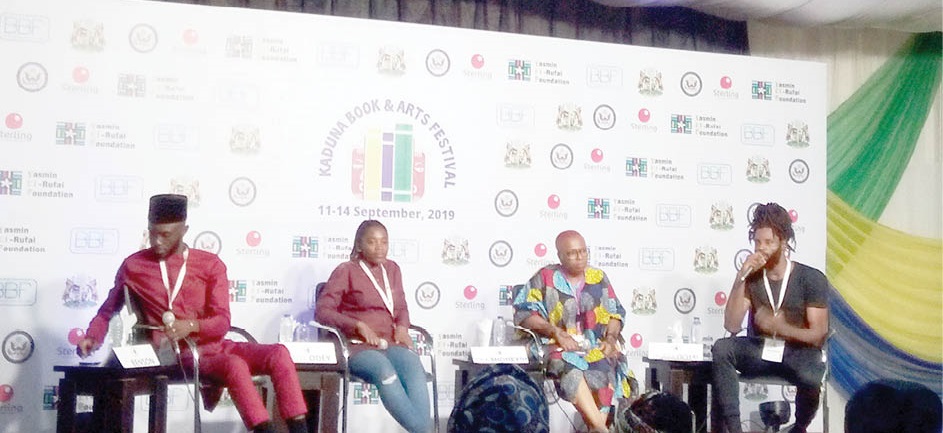KABAFEST: Mental health, banditry, rape take centre stage
The 2019 Kaduna Book and Arts Festival (KABAFEST) took place from September 11 to 14. It was an opportunity to interrogate diverse issues affecting Nigeria, especially the north. This year’s edition of the Kaduna Book and Arts Festival (KABAFEST) interrogated a lot of issues, including rape, art development, feminism and several other burning topics. Typical […]

TJ Benson, Daisy Odey, Lola Shoneyin and Ochai Ogaba at a panel
The 2019 Kaduna Book and Arts Festival (KABAFEST) took place from September 11 to 14. It was an opportunity to interrogate diverse issues affecting Nigeria, especially the north.
This year’s edition of the Kaduna Book and Arts Festival (KABAFEST) interrogated a lot of issues, including rape, art development, feminism and several other burning topics.
Typical of the event which debuted in 2017, there was a wide array of guests, consisting writers, thinkers, scholars, musicians, dancers and artists.
The Kaduna State governor, Mallam Nasir El-Rufai, represented by his deputy, Dr. Hadiza Balarabe, officially opened the festival on Wednesday, stating that, with this year’s edition, the state government’s “aspiration to institutionalise KABAFEST, is being attained.”
Several panel discussions and book chats took place alongside dance and other performances.
In a discussion on banditry, kidnapping and the psychological impact of violence in Nigeria, Aisha Armiyau, a mental health practitioner who works at a tertiary healthcare facility in Jos, pointed out that health issues are always ignored in camps for internally displaced persons (IDPs).
Armiyau said that food is provided for IDPs without considering the fact that health does not just involve the physical and social, but also the mental wellbeing of an individual.
“It does not make sense to take traumatized victims to Abuja,” she said, adding that such people need attention paid to their mental health.
A member of the panel, Folarin Banigbe, author of “Abduction Chronicles,” talked about his experience when kidnapped and how security operatives, who ought to investigate, are part of the problem.
In another panel, Fakhrriyyah Hashim, who pioneered the ‘Arewa Me Too’ movement, a space for conversing on sexual violence, narrated how sexual violence became prevalent in a local community in Nigeria and how rape is fast becoming a part of the society. Fortunately, instead of the habitual silence, her platform has encouraged women to come out and speak up about domestic violence, sexual assault and rape.
In a chat on developing the arts in northern Nigeria, curator of the festival, Lola Shoneyin revealed that Chris Abani, a United States-based Nigerian writer, along with a small team are making plans to translate Hausa literature, popularly known as Soyayya novels.
During the discourse, which put Nigeria’s government on the spotlight as regards supporting the arts, the first lady of Kaduna State, Architect Hadiza Isma El-Rufai pointed out that “government funding of the arts in developed countries should not be compared with Nigeria, which is a developing nation.”
Asides discussions on topical issues, there was also time to relax at the festival with thought-provoking screenings of movies and documentaries such as Ishaya Bako’s ‘Fourth Republic’ (focused on the corruption in Nigeria’s election system) and Ruona Meyer’s ‘Sweet, Sweet Codeine,’ an investigation produced and broadcast by the BBC, on the devastating addiction to codeine syrup in Nigeria.
In this year’s KABAFEST, award-winning writers such as Tope Folarin (winner of the 2013 Caine Prize for African Writing), Oyinkan Braithwaite (longlisted for this year’s Booker Prize), Nnamdi Oguike (author of ‘Do Not Say It’s Not Your Country’), and several others, read from their works and interacted with the audience.
During the opening ceremony, Professor Ahmed Yerima who has written over sixty published plays, was presented with a Lifetime Achievement Award by Dr. Balarabe.
